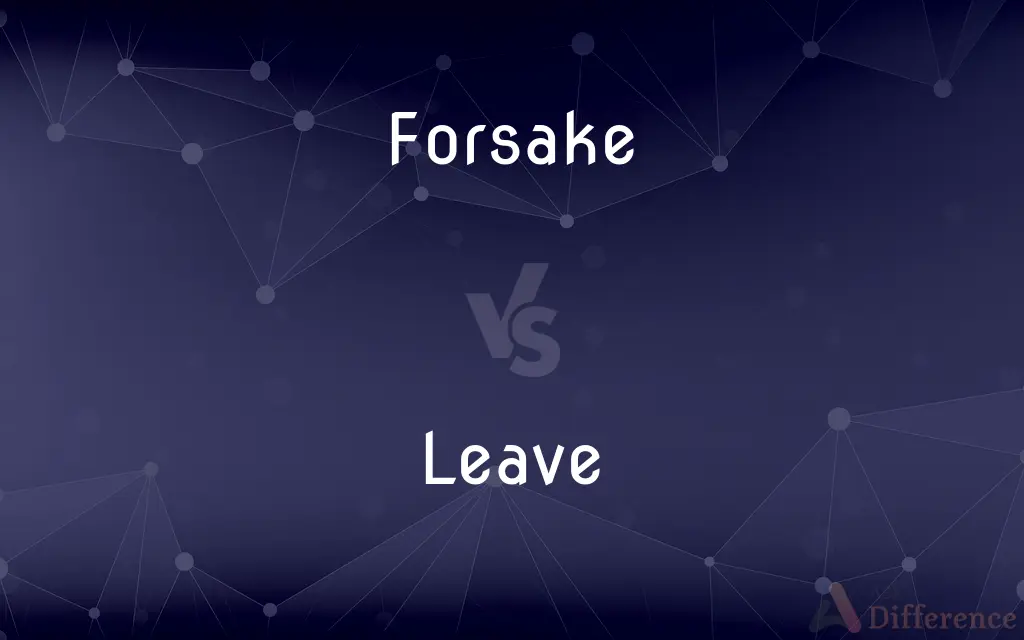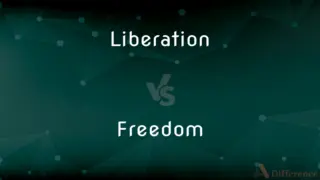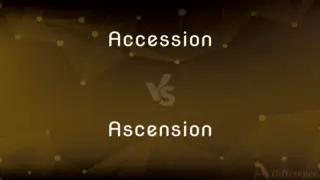Forsake vs. Leave — What's the Difference?

Difference Between Forsake and Leave
ADVERTISEMENT
Compare with Definitions
Forsake
To give up (something formerly held dear); renounce
Forsook liquor.
Leave
Go away from
The England team left for Pakistan on Monday
We were almost the last to leave
She left London on June 6
Forsake
To leave altogether; abandon
Forsook Hollywood and returned to the legitimate stage.
Leave
Allow or cause to remain
The parts he disliked he would alter and the parts he didn't dislike he'd leave
Forsake
(transitive) To abandon, to give up, to leave (permanently), to renounce (someone or something).
ADVERTISEMENT
Leave
Cause (someone or something) to be in a particular state or position
I'll leave the door open
He'll leave you in no doubt about what he thinks
The children were left with feelings of loss
Forsake
To decline or refuse (something offered).
Leave
(of a plant) put out new leaves
Trees leaved, wild flowers burst in profusion on the far side of the lake
Forsake
To avoid or shun (someone or something).
Leave
(in snooker, croquet, and other games) the position in which a player leaves the balls for the next player.
Forsake
To cause disappointment to; to be insufficient for (someone or something).
Leave
Time when one has permission to be absent from work or from duty in the armed forces
Joe was home on leave
Maternity leave
Forsake
To quit or leave entirely; to desert; to abandon; to depart or withdraw from; to leave; as, false friends and flatterers forsake us in adversity.
If his children forsake my law, and walk not in my judgments.
Leave
Permission
Leave from the court to commence an action
Forsake
To renounce; to reject; to refuse.
If you forsake the offer of their love.
Leave
To go out of or away from
Not allowed to leave the room.
Forsake
Leave someone who needs or counts on you; leave in the lurch;
The mother deserted her children
Leave
To go without taking or removing
Left my book on the bus.
Leave
To omit or exclude
Left out the funniest part of the story.
Leave
To have as a result, consequence, or remainder
The car left a trail of exhaust fumes. Two from eight leaves six.
Leave
To cause or allow to be or remain in a specified state
Left the lights on.
Leave
To have remaining after death
Left a young son.
Leave
To bequeath
Left her money to charity.
Leave
To give over to another to control or act on
Leave all the details to us.
Leave
To abandon or forsake
Leave home.
Left her husband.
Leave
To remove oneself from association with or participation in
Left the navy for civilian life.
Leave
To give or deposit, as for use or information, upon one's departure or in one's absence
He left a note for you. Leave your name and address.
Leave
To cause or permit to be or remain
Left myself plenty of time.
Leave
(Nonstandard) To allow or permit; let.
Leave
To set out or depart; go
When can you leave?.
Leave
To put forth foliage; leaf.
Leave
Permission to do something.
Leave
An act of departing; a farewell
Took leave of her with a heavy heart.
Leave
See leave of absence.
Leave
To have a consequence or remnant.
Leave
(transitive) To cause or allow (something) to remain as available; to refrain from taking (something) away; to stop short of consuming or otherwise depleting (something) entirely.
I left my car at home and took a bus to work.
The ants did not leave so much as a crumb of bread.
There's not much food left. We'd better go to the shops.
Leave
To cause, to result in.
The lightning left her dazzled for several minutes.
Infantile paralysis left him lame for the rest of his life.
She left disappointed.
Leave
(transitive) To put; to place; to deposit; to deliver, with a sense of withdrawing oneself.
Leave your hat in the hall.
We should leave the legal matters to lawyers.
I left my sewing and went to the window to watch the falling snow.
Leave
To depart; to separate from.
Leave
To let be or do without interference.
I left him to his reflections.
I leave my hearers to judge.
Leave
(transitive) To depart from; to end one's connection or affiliation with.
I left the country and I left my wife.
Leave
(transitive) To end one's membership in (a group); to terminate one's affiliation with (an organization); to stop participating in (a project).
I left the band.
Leave
(intransitive) To depart; to go away from a certain place or state.
I think you'd better leave.
Leave
To transfer something.
Leave
(transitive) To transfer possession of after death.
When my father died, he left me the house.
Leave
(transitive) To give (something) to someone; to deliver (something) to a repository; to deposit.
I'll leave the car in the station so you can pick it up there.
Leave
(transitive) To transfer responsibility or attention of (something) (to someone); to stop being concerned with.
Can't we just leave this to the experts?
Leave
To remain (behind); to stay.
Leave
To stop, desist from; to "leave off" (+ noun / gerund).
Leave
(transitive) To give leave to; allow; permit; let; grant.
We were not left go to the beach after school except on a weekend.
Leave
To produce leaves or foliage.
Leave
(obsolete) To raise; to levy.
Leave
(cricket) The action of the batsman not attempting to play at the ball.
Leave
(billiards) The arrangement of balls in play that remains after a shot is made (which determines whether the next shooter — who may be either the same player, or an opponent — has good options, or only poor ones).
Leave
Permission to be absent; time away from one's work.
I've been given three weeks' leave by my boss.
Leave
Permission.
Might I beg leave to accompany you?
The applicant now seeks leave to appeal and, if leave be granted, to appeal against these sentences.
Leave
(dated) Farewell, departure.
I took my leave of the gentleman without a backward glance.
Leave
To send out leaves; to leaf; - often with out.
Leave
To raise; to levy.
An army strong she leaved.
Leave
To withdraw one's self from; to go away from; to depart from; as, to leave the house.
Therefore shall a man leave his father and his mother, and shall cleave unto his wife.
Leave
To let remain unremoved or undone; to let stay or continue, in distinction from what is removed or changed.
If grape gatherers come to thee, would they not leave some gleaning grapes ?
These ought ye to have done, and not to leave the other undone.
Besides it leaveth a suspicion, as if more might be said than is expressed.
Leave
To cease from; to desist from; to abstain from.
Now leave complaining and begin your tea.
Leave
To desert; to abandon; to forsake; hence, to give up; to relinquish.
Lo, we have left all, and have followed thee.
The heresies that men do leave.
Leave
To let be or do without interference; as, I left him to his reflections; I leave my hearers to judge.
I will leave you now to your gossiplike humor.
Leave
To put; to place; to deposit; to deliver; to commit; to submit - with a sense of withdrawing one's self from; as, leave your hat in the hall; we left our cards; to leave the matter to arbitrators.
Leave there thy gift before the altar and go thy way.
The footThat leaves the print of blood where'er it walks.
Leave
To have remaining at death; hence, to bequeath; as, he left a large estate; he left a good name; he left a legacy to his niece.
Leave
To cause to be; - followed by an adjective or adverb describing a state or condition; as, the losses due to fire leave me penniless; The cost of defending himself left Bill Clinton with a mountain of lawyers' bills.
Leave
To depart; to set out.
By the time I left for Scotland.
Leave
To cease; to desist; to leave off.
Leave off, and for another summons wait.
Leave
Liberty granted by which restraint or illegality is removed; permission; allowance; license.
David earnestly asked leave of me.
No friend has leave to bear away the dead.
Leave
The act of leaving or departing; a formal parting; a leaving; farewell; adieu; - used chiefly in the phrase, to take leave, i. e., literally, to take permission to go.
A double blessing is a'double grace;Occasion smiles upon a second leave.
And Paul after this tarried there yet a good while, and then took his leave of the brethren.
Leave
The period of time during which you are absent from work or duty;
A ten day's leave to visit his mother
Leave
Permission to do something;
She was granted leave to speak
Leave
The act of departing politely;
He disliked long farewells
He took his leave
Parting is such sweet sorrow
Leave
Go away from a place;
At what time does your train leave?
She didn't leave until midnight
The ship leaves at midnight
Leave
Go and leave behind, either intentionally or by neglect or forgetfulness;
She left a mess when she moved out
His good luck finally left him
Her husband left her after 20 years of marriage
She wept thinking she had been left behind
Leave
Act or be so as to become in a specified state;
The inflation left them penniless
The president's remarks left us speechless
Leave
Leave unchanged or undisturbed or refrain from taking;
Leave it as is
Leave the young fawn alone
Leave the flowers that you see in the park behind
Leave
Move out of or depart from;
Leave the room
The fugitive has left the country
Leave
Make a possibility or provide opportunity for; permit to be attainable or cause to remain;
This leaves no room for improvement
The evidence allows only one conclusion
Allow for mistakes
Leave lots of time for the trip
This procedure provides for lots of leeway
Leave
Result in;
The water left a mark on the silk dress
Her blood left a stain on the napkin
Leave
Remove oneself from an association with or participation in;
She wants to leave
The teenager left home
She left her position with the Red Cross
He left the Senate after two terms
After 20 years with the same company, she pulled up stakes
Leave
Put into the care or protection of someone;
He left the decision to his deputy
Leave your child the nurse's care
Leave
Leave or give by will after one's death;
My aunt bequeathed me all her jewelry
My grandfather left me his entire estate
Leave
Have left or have as a remainder;
That left the four of us
19 minus 8 leaves 11
Leave
Be survived by after one's death;
He left six children
At her death, she left behind her husband and 11 cats
Leave
Tell or deposit (information) knowledge;
Give a secret to the Russians
Leave your name and address here
Leave
Leave behind unintentionally;
I forgot my umbrella in the restaurant
I left my keys inside the car and locked the doors
Share Your Discovery

Previous Comparison
Liberation vs. Freedom
Next Comparison
Accession vs. Ascension














































